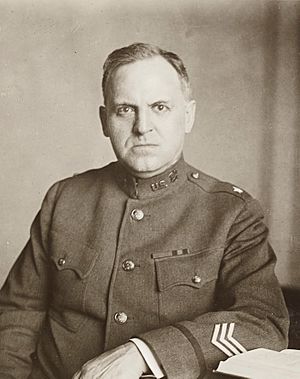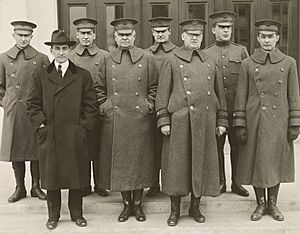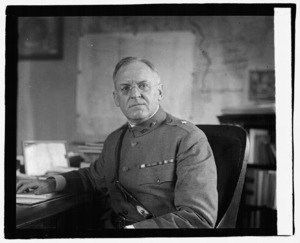Herbert Lord facts for kids
Quick facts for kids
Herbert Mayhew Lord
|
|
|---|---|

Lord at work in the Munitions Building, January 1919
|
|
| 2nd Director of the United States Agency of the Budget | |
| In office July 1, 1922 – May 31, 1929 |
|
| President | Warren G. Harding Calvin Coolidge Herbert Hoover |
| Preceded by | Charles G. Dawes |
| Succeeded by | Clawson Roop |
| Personal details | |
| Born | December 6, 1859 Rockland, Maine, U.S. |
| Died | June 2, 1930 (aged 70) Washington, D.C., U.S. |
| Resting place | Arlington National Cemetery |
| Political party | Republican |
| Spouse | Annie Stuart Waldo (m. 1886-1930, his death) |
| Children | 3 |
| Education | Colby College (AB, MA) |
| Occupation | Journalist Staff, United States House of Representatives |
| Military service | |
| Allegiance | |
| Branch/service | |
| Years of service | 1898-1922 |
| Rank | |
| Unit | U.S. Army Paymaster Department |
| Commands | Director of Finance, United States Army |
| Battles/wars | Spanish–American War World War I |
| Awards | Army Distinguished Service Medal |
Herbert Mayhew Lord (December 6, 1859 – June 2, 1930) was an important officer in the United States Army and a public official. He is best known for his work as the Army's Director of Finance during World War I. He also served as the Director of the United States Bureau of the Budget (which is now called the Office of Management and Budget) from 1922 to 1929.
Born in Rockland, Maine, Lord earned his bachelor's and master's degrees from Colby College. He started his career as a newspaper reporter and editor. Later, while working for the United States House of Representatives, he helped create the Dingley Act. This law raised taxes on imported goods, called tariffs, to help the country's economy. In 1898, Lord joined the military as a major during the Spanish–American War. He worked in the Army's Paymaster Department, which handles money. After the war, he continued to work with Army finances. He often helped with special projects, like managing money for disaster relief after the Great Salem fire of 1914.
During World War I, Lord was promoted to brigadier general. As the Army's Director of Finance, he managed a huge amount of money, about $24 billion, for the War Department. After the war, he made sure that businesses were paid for the goods and services they provided during the conflict. This helped prevent an economic crisis. He also took action to provide disability payments to soldiers who were hurt or became very sick during the war. In 1922, Lord became the budget director. He stayed in this role until 1929. He focused on saving money in the government, which helped pay off the country's World War I debt. His efforts also created a surplus, meaning the government had extra money.
Lord became ill in 1929 and stepped down from his role as budget director. His health did not get better, and he passed away in Washington, D.C., on June 2, 1930. He was buried at Arlington National Cemetery.
Contents
Early Life and Education
Herbert M. Lord was born in Rockland, Maine, on December 6, 1859. His parents were Sabin and Abbie (Swett) Lord. He grew up and went to school in Rockland, graduating from Rockland High School.
Lord first attended Bates College before transferring to Colby College. He earned his first degree from Colby in 1884. While studying for his master's degree, he worked as a teacher. He taught Greek, Latin, and English languages. He also served as the principal of the high school in Thomaston, Maine. Lord was also a talented musician who taught and sang. His singing voice was so good that some people thought he could have become a professional singer.
He received his master's degree from Colby in 1889. While at Colby, Lord joined the Delta Upsilon fraternity. In 1920, Colby College gave Lord an honorary degree, called a LL.D..
Early Career in Journalism and Government
After college, Lord started working in journalism at a newspaper in Cardiff, Tennessee. He worked there as a reporter, editor, and advertising manager. Next, he worked for a newspaper in Denver, Colorado, before returning to Maine. Lord then became the editor of The Courier-Gazette in Rockland. He later bought a part of the newspaper. As a member of the Republican party, he also served on the city council in Rockland.
In 1894, Lord began working for U.S. Representative Nelson Dingley Jr. of Maine. He joined the staff of the Ways and Means Committee. This committee helps create tax laws. When Dingley became the head of the committee in 1897, he made Lord the chief clerk. Lord helped work on the details of the Dingley Act. This law raised tariffs, which are taxes on goods imported from other countries. This was done to balance out an earlier law that had lowered these taxes.
Military Service and Financial Leadership
In 1898, Lord joined the United States Army during the Spanish–American War. He was made a major in the United States Volunteers. He was assigned to the Paymaster Department, which handles the Army's money. After the war, he joined the Regular Army. In 1902, Lord became a captain and continued to work in the Paymaster Department.

In 1908, when Lord was a major, President Theodore Roosevelt asked him to help the United States Congress create a new tariff law. This law, called the Payne–Aldrich Tariff Act of 1909, caused disagreements among politicians. In 1910, Lord was chosen to manage U.S. funds given to the government of Cuba. This happened after the United States military's Second Occupation of Cuba.
After the devastating Great Salem fire of 1914, President Woodrow Wilson asked Lord to manage federal money for disaster relief. About $200,000 was set aside for this effort. Lord was praised for handling all requests for help so well that he saved $150,000 of the fund.
During World War I, Lord served as the Army's Director of Finance. He was promoted to brigadier general. He was in charge of spending $24 billion that the War Department had been given.
In March 1919, Congress ended its session without making plans to pay over $800 million. This money was owed by the military to factories, railroads, and other businesses for their wartime services and supplies. Lord took action on his own. He used money set aside for other purposes to pay these debts, which had grown to over $1 billion. This helped satisfy the businesses and prevented a major economic problem. When Congress met again, they officially approved Lord's actions.

After the war, many soldiers who had been wounded or seriously ill applied for disability payments. Because wartime records were often messy, veterans sometimes didn't have clear proof of their service or medical condition. Lord decided to pay them based on their own word. The War Department later used central records to check their eligibility. Lord's efforts helped these veterans get their payments quickly. Again, Congress later approved his actions.
Lord retired from the Army on June 30, 1922. He then accepted the job as Director of the U.S. Bureau of the Budget. He took over from the first director, Charles G. Dawes.
Leading the Budget Bureau
Lord started his role as budget director on July 1, 1922. During his time, Lord focused on saving money in government spending. This was a policy supported by President Calvin Coolidge and continued by President Herbert Hoover. Many people thought Lord was very focused on cutting costs. For example, he suggested making postal money order forms one inch smaller to save $8,000 a year. Some people made fun of him when he said government employees should use their pencils longer to save money.
Despite the jokes, when Lord left his job in 1929, the country's World War I debt had been paid off. Also, the federal government had a surplus of $2.7 billion. About $2.4 billion of this extra money was thanks to Lord's efforts to save money.
Later Life and Legacy
Lord became very ill in 1929, which led him to resign as budget director. He spent some time in St. Petersburg, Florida, during the winter of 1929-1930, hoping to get better. However, his health continued to decline. He passed away at his home in Washington, D.C., on June 2, 1930. Herbert Lord was buried at Arlington National Cemetery.
Family Life
In 1886, Herbert Lord married Annie Stuart Waldo. They had three children together. Their first child, Stuart Waldo Lord, was born in 1886 and died in 1889. Their son, Kenneth Prince Lord (1888-1957), became an Army officer and retired as a brigadier general. Their daughter, Ruth Mayhew Lord (1890-1974), married Franklin Robinson Van Rensselaer.

